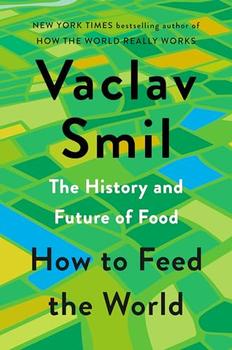
The History and Future of Food
by Vaclav Smil
An indispensable analysis of how the world really produces and consumes its food—and a scientist's exploration of how we can successfully feed a growing population without killing the planet.
We have never had to feed as many people as we do today. And yet, we misunderstand the essentials of where our food really comes from, how our dietary requirements shape us, and why this impacts our planet in drastic ways. As a result, in our economic, political, and everyday choices, we take for granted and fail to prioritize the thing that makes all our lives possible: food.
In this ambitious, myth-busting book, Smil investigates many of the burning questions facing the world today: why are some of the world's biggest food producers also the countries with the most undernourished populations? Why do we waste so much food and how can we solve that? Could the whole planet go vegan and be healthy? Should it? He explores the global history of food production to understand why we farm some animals and not others, why most of the world's calories come from just a few foodstuffs, and how this might change in the future.
How to Feed the World is the data-based, rigorously researched guide that offers solutions to our broken global food system.
"Though persuasive, this is a bit of a slog." —Publishers Weekly
"A sensible vision of the future that calls for 'incremental changes.'" —Kirkus Reviews
"Vaclav Smil is my favorite author." —Bill Gates
This information about How to Feed the World was first featured
in "The BookBrowse Review" - BookBrowse's membership magazine, and in our weekly "Publishing This Week" newsletter. Publication information is for the USA, and (unless stated otherwise) represents the first print edition. The reviews are necessarily limited to those that were available to us ahead of publication. If you are the publisher or author and feel that they do not properly reflect the range of media opinion now available, send us a message with the mainstream reviews that you would like to see added.
Any "Author Information" displayed below reflects the author's biography at the time this particular book was published.
Vaclav Smil is Distinguished Professor Emeritus at the University of Manitoba. He is the author of over forty books on topics including energy, environmental and population change, food production and nutrition, technical innovation, risk assessment, and public policy. A Fellow of the Royal Society of Canada, in 2010 he was named by Foreign Policy as one of the Top 100 Global Thinkers. He is the author of Numbers Don't Lie, Size, and the New York Times bestselling How the World Really Works.
Your guide toexceptional books
BookBrowse seeks out and recommends the best in contemporary fiction and nonfiction—books that not only engage and entertain but also deepen our understanding of ourselves and the world around us.